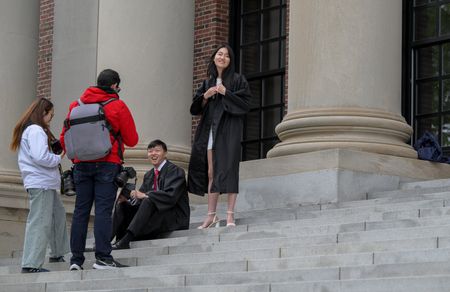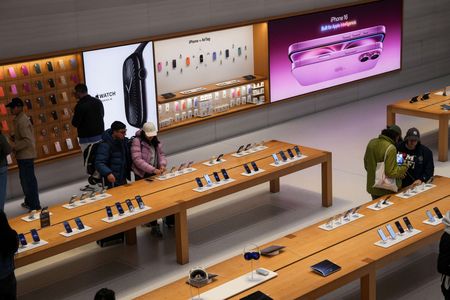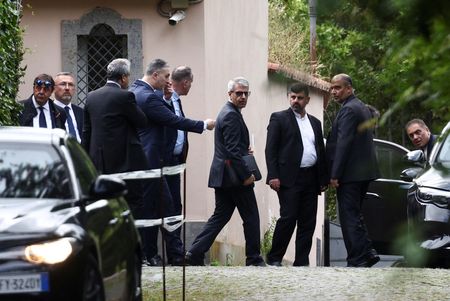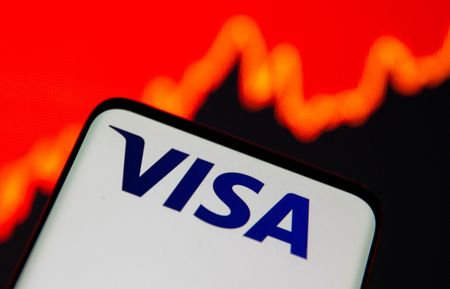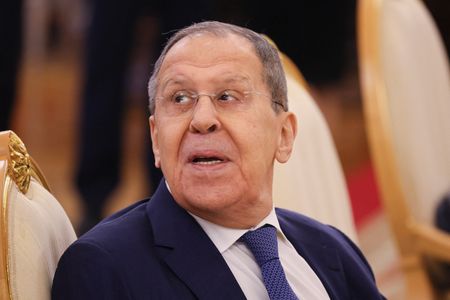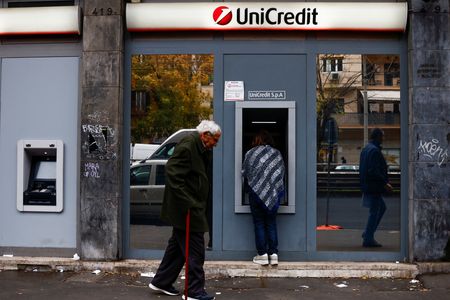LONDON (Reuters) -U.S. President Donald Trump threatened once again on Friday to ramp up his trade war, recommending a 50% tariff on European Union goods starting June 1 and warning Apple he may impose a 25% tariff on iPhones manufactured outside the U.S.
Here is some reaction to the EU tariff news:
VOLVO CARS CEO HAKAN SAMUELSSON IN AN INTERVIEW WITH REUTERS:
Samuelsson said a 50% tariff would limit the ability of Volvo Cars to sell its Belgium-made EX30 electric vehicle in the United States.
“I believe there will be a deal soon. It could not be in the interest of Europe or the U.S. to shut down trade between them.”
GERMAN ECONOMY MINISTER KATHERINA REICHE:
“Trade conflicts have no winners. We must do everything to ensure that the European Commission reaches a negotiated solution with the United States.
“Tariffs harm both the U.S. and the EU equally. We need more trade, not less. We are in intensive contact with the European Commission on this matter.”
DUTCH PRIME MINISTER DICK SCHOOF:
“We (the EU) will stick to the path we’ve chosen. At the same time we will see how negotiations will proceed after today’s announcement. We have seen before that tariffs can go up and down in talks with the U.S.”
DISTILLED SPIRITS COUNCIL OF THE UNITED STATES (DISCUS) PRESIDENT AND CEO CHRIS SWONGER:
“U.S. distillers recently breathed a huge sigh of relief when the EU chose not to impose a 50% tariff on American Whiskey in the steel and aluminum dispute.
“The EU’s action gave U.S. distillers a glimmer of hope that the U.S. and EU could find common ground and avoid any additional tariff escalation.”
VOLKER TREIER, HEAD OF TRADE AT GERMANY’S DIHK CHAMBER OF COMMERCE:
“Donald Trump’s announcement is a provocative U-turn. A tariff rate of 50% will hit German companies with full force and further weaken the world trade order.
“The EU’s willingness to engage in dialogue must be maintained despite this announcement by the U.S. president. From a business perspective, it is crucial that the EU does not rashly enter into a bad deal that will have long-term negative consequences for Germany as a business location.”
THE FRENCH COSMETIC INDUSTRY ASSOCIATION (FEBEA):
“The cosmetics industry is calling for a balanced agreement with the United States.
“We remain calm and trust European negotiators to quickly conclude a EU-U.S. agreement, as this is, above all, a European issue. The American market is our largest export market outside the European Union.”
GIUSEPPE ALOISIO, DIRECTOR GENERAL OF SPAIN’S ANICE MEAT INDUSTRIES ASSOCIATION:
“It’s just another announcement, with no specific dates or milestones. It’s probably a way to apply pressure, given their strong negotiating position, to speed up the resolution of the dispute with the EU.
“Once again, we will have to wait and see how things unfold and be prepared to face the challenge of a possible increase in export costs and the indirect opportunities that could arise in other markets.”
WOLFGANG GROSSE ENTRUP, MANAGING DIRECTOR AT GERMANY’S CHEMICAL INDUSTRY ASSOCIATION:
“The German chemical-pharmaceutical industry remains hopeful that the U.S. and the EU will agree on a reduction of barriers in transatlantic trade.
“At the same time, it is clear: The situation remains fragile and uncertainty is high. In addition to successful negotiations with the U.S., strengthening the European industry, the EU internal market, and deepening relations with other regions must therefore be given high priority.”
DIRK JANDURA, PRESIDENT OF GERMANY’S BGA TRADE ASSOCIATION, WHICH REPRESENTS BUSINESSES INVOLVED IN WHOLESALE, INTERNATIONAL TRADE AND SERVICE SECTORS:
“This trade war is a strategic and economic mistake by the U.S. administration. It is the same game that was unsuccessfully attempted with China. In the end, both sides will lose.
“Should the USA further increase tariffs on goods from the EU, the EU will respond with equally high burdens on American goods. This costs prosperity and growth and fuels inflation. It would be better to finally negotiate on equal terms and with mutual openness and respect.”
(Reporting by Reuters; Editing by Andrew Heavens and Susan Fenton)



